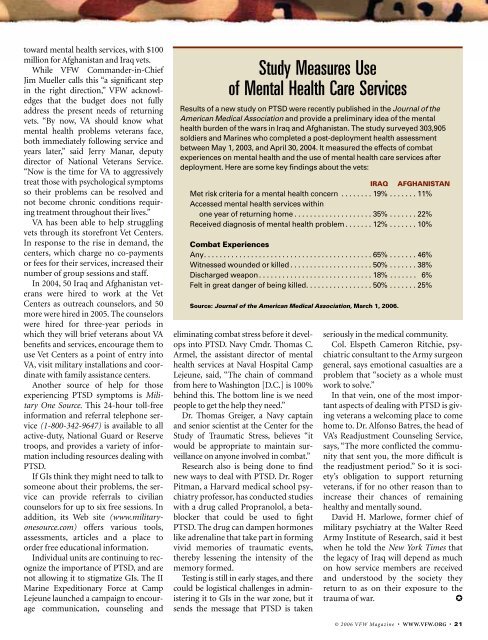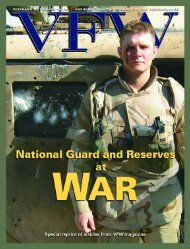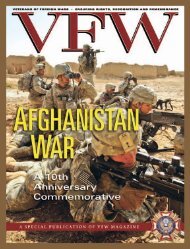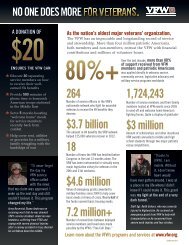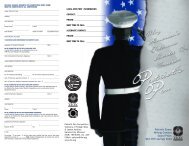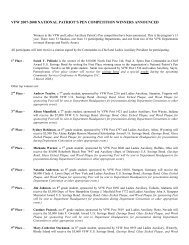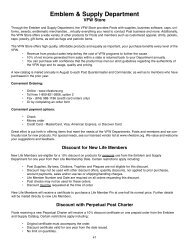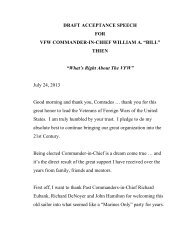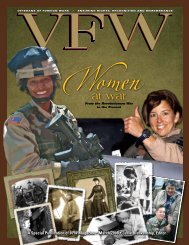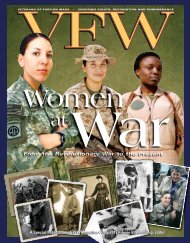2006 VFW Magazine - Veterans of Foreign Wars
2006 VFW Magazine - Veterans of Foreign Wars
2006 VFW Magazine - Veterans of Foreign Wars
You also want an ePaper? Increase the reach of your titles
YUMPU automatically turns print PDFs into web optimized ePapers that Google loves.
toward mental health services, with $100<br />
million for Afghanistan and Iraq vets.<br />
While <strong>VFW</strong> Commander-in-Chief<br />
Jim Mueller calls this “a significant step<br />
in the right direction,” <strong>VFW</strong> acknowledges<br />
that the budget does not fully<br />
address the present needs <strong>of</strong> returning<br />
vets. “By now, VA should know what<br />
mental health problems veterans face,<br />
both immediately following service and<br />
years later,” said Jerry Manar, deputy<br />
director <strong>of</strong> National <strong>Veterans</strong> Service.<br />
“Now is the time for VA to aggressively<br />
treat those with psychological symptoms<br />
so their problems can be resolved and<br />
not become chronic conditions requiring<br />
treatment throughout their lives.”<br />
VA has been able to help struggling<br />
vets through its storefront Vet Centers.<br />
In response to the rise in demand, the<br />
centers, which charge no co-payments<br />
or fees for their services, increased their<br />
number <strong>of</strong> group sessions and staff.<br />
In 2004, 50 Iraq and Afghanistan veterans<br />
were hired to work at the Vet<br />
Centers as outreach counselors, and 50<br />
more were hired in 2005. The counselors<br />
were hired for three-year periods in<br />
which they will brief veterans about VA<br />
benefits and services, encourage them to<br />
use Vet Centers as a point <strong>of</strong> entry into<br />
VA, visit military installations and coordinate<br />
with family assistance centers.<br />
Another source <strong>of</strong> help for those<br />
experiencing PTSD symptoms is Military<br />
One Source. This 24-hour toll-free<br />
information and referral telephone service<br />
(1-800-342-9647) is available to all<br />
active-duty, National Guard or Reserve<br />
troops, and provides a variety <strong>of</strong> information<br />
including resources dealing with<br />
PTSD.<br />
If GIs think they might need to talk to<br />
someone about their problems, the service<br />
can provide referrals to civilian<br />
counselors for up to six free sessions. In<br />
addition, its Web site (www.militaryonesource.com)<br />
<strong>of</strong>fers various tools,<br />
assessments, articles and a place to<br />
order free educational information.<br />
Individual units are continuing to recognize<br />
the importance <strong>of</strong> PTSD, and are<br />
not allowing it to stigmatize GIs. The II<br />
Marine Expeditionary Force at Camp<br />
Lejeune launched a campaign to encourage<br />
communication, counseling and<br />
Study Measures Use<br />
<strong>of</strong> Mental Health Care Services<br />
Results <strong>of</strong> a new study on PTSD were recently published in the Journal <strong>of</strong> the<br />
American Medical Association and provide a preliminary idea <strong>of</strong> the mental<br />
health burden <strong>of</strong> the wars in Iraq and Afghanistan. The study surveyed 303,905<br />
soldiers and Marines who completed a post-deployment health assessment<br />
between May 1, 2003, and April 30, 2004. It measured the effects <strong>of</strong> combat<br />
experiences on mental health and the use <strong>of</strong> mental health care services after<br />
deployment. Here are some key findings about the vets:<br />
IRAQ AFGHANISTAN<br />
Met risk criteria for a mental health concern . . . . . . . . 19% . . . . . . . 11%<br />
Accessed mental health services within<br />
one year <strong>of</strong> returning home . . . . . . . . . . . . . . . . . . . . 35% . . . . . . . 22%<br />
Received diagnosis <strong>of</strong> mental health problem . . . . . . . 12% . . . . . . . 10%<br />
Combat Experiences<br />
Any. . . . . . . . . . . . . . . . . . . . . . . . . . . . . . . . . . . . . . . . . . . 65% . . . . . . . 46%<br />
Witnessed wounded or killed . . . . . . . . . . . . . . . . . . . . . 50% . . . . . . . 38%<br />
Discharged weapon . . . . . . . . . . . . . . . . . . . . . . . . . . . . . 18% . . . . . . . 6%<br />
Felt in great danger <strong>of</strong> being killed. . . . . . . . . . . . . . . . . 50% . . . . . . . 25%<br />
Source: Journal <strong>of</strong> the American Medical Association, March 1, <strong>2006</strong>.<br />
eliminating combat stress before it develops<br />
into PTSD. Navy Cmdr. Thomas C.<br />
Armel, the assistant director <strong>of</strong> mental<br />
health services at Naval Hospital Camp<br />
Lejeune, said, “The chain <strong>of</strong> command<br />
from here to Washington [D.C.] is 100%<br />
behind this. The bottom line is we need<br />
people to get the help they need.”<br />
Dr. Thomas Greiger, a Navy captain<br />
and senior scientist at the Center for the<br />
Study <strong>of</strong> Traumatic Stress, believes “it<br />
would be appropriate to maintain surveillance<br />
on anyone involved in combat.”<br />
Research also is being done to find<br />
new ways to deal with PTSD. Dr. Roger<br />
Pitman, a Harvard medical school psychiatry<br />
pr<strong>of</strong>essor, has conducted studies<br />
with a drug called Propranolol, a betablocker<br />
that could be used to fight<br />
PTSD. The drug can dampen hormones<br />
like adrenaline that take part in forming<br />
vivid memories <strong>of</strong> traumatic events,<br />
thereby lessening the intensity <strong>of</strong> the<br />
memory formed.<br />
Testing is still in early stages, and there<br />
could be logistical challenges in administering<br />
it to GIs in the war zone, but it<br />
sends the message that PTSD is taken<br />
seriously in the medical community.<br />
Col. Elspeth Cameron Ritchie, psychiatric<br />
consultant to the Army surgeon<br />
general, says emotional casualties are a<br />
problem that “society as a whole must<br />
work to solve.”<br />
In that vein, one <strong>of</strong> the most important<br />
aspects <strong>of</strong> dealing with PTSD is giving<br />
veterans a welcoming place to come<br />
home to. Dr. Alfonso Batres, the head <strong>of</strong><br />
VA’s Readjustment Counseling Service,<br />
says, “The more conflicted the community<br />
that sent you, the more difficult is<br />
the readjustment period.” So it is society’s<br />
obligation to support returning<br />
veterans, if for no other reason than to<br />
increase their chances <strong>of</strong> remaining<br />
healthy and mentally sound.<br />
David H. Marlowe, former chief <strong>of</strong><br />
military psychiatry at the Walter Reed<br />
Army Institute <strong>of</strong> Research, said it best<br />
when he told the New York Times that<br />
the legacy <strong>of</strong> Iraq will depend as much<br />
on how service members are received<br />
and understood by the society they<br />
return to as on their exposure to the<br />
trauma <strong>of</strong> war.<br />
✪<br />
© <strong>2006</strong> <strong>VFW</strong> <strong>Magazine</strong> • WWW.<strong>VFW</strong>.ORG • 21


